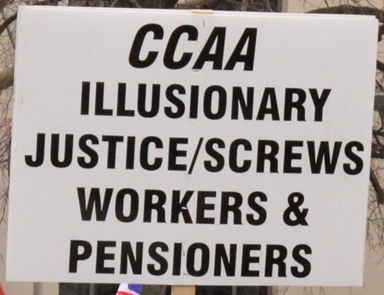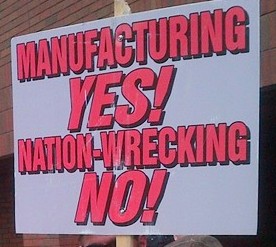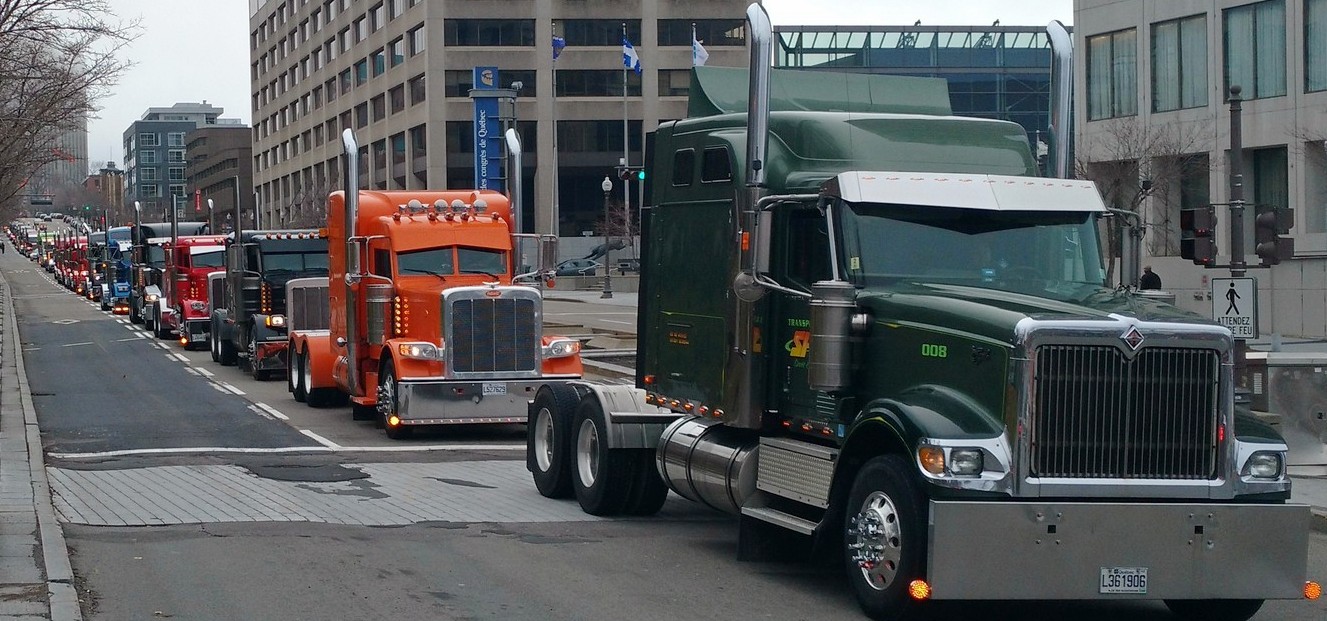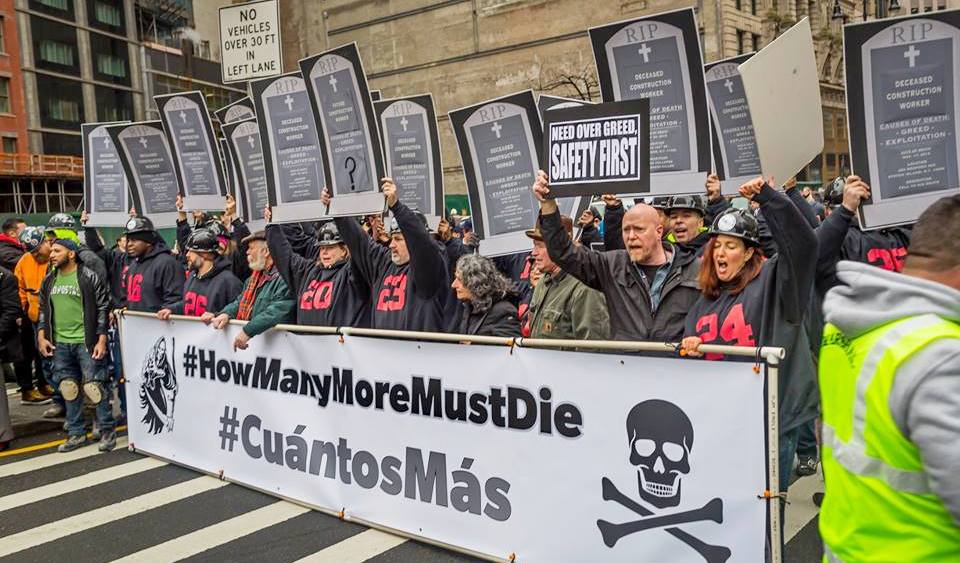State-Organized Attempts to Impose
Concessions
• Oppose Attack on Essar Algoma Steelworkers'
Right to
Strike
Interview
• Outaouais Public Transit Workers Confront
Attacks on
Working Conditions - A Gatineau
Bus Driver
Workers' Struggle for
Their Health and Safety in the Workplace
• Stop the Tragedies in the Trucking Industry
- Normand Chouinard
• New York Construction Workers Ask "How Many
More Must Die!"
State-Organized Attempts to Impose
Concessions
Oppose Attack on Essar Algoma Steelworkers'
Right to Strike
The 2,100 steelworkers of Essar Steel Algoma are facing
a
state-organized attack on their right to strike. In an extremely
provocative move, the executives presently in control of the steel
company in Sault Ste. Marie served Algoma steelworkers' Local
union 2251 a notice that they may seek a no-board report from the
Ontario Ministry of Labour and unilaterally impose concessionary
contract terms sometime around February 20.

USW Local 2251 members
gathered in meetings to prepare a plan of action to defend their
rights. They discussed the provocation
and the concessions the Algoma executives threaten to impose. These
include an across-the-board 10 per cent wage reduction,
elimination of cost of living increases, and reduction of paid
vacations amongst other changes.
In an interview with SooToday, Local 2251
President Mike Da Prat said, "Once the no-board report is issued, there
are
14 days before the company can lock us out, the union can strike, or
there could be terms imposed unilaterally by the company.
Once the no-board report is issued, we will definitely be calling a
vote. Now, we have to put in motion all those issues and
practices that are required for a strike."
An issue in this provocation against steelworkers
arises from the
current inter-imperialist fight over who owns and controls
Essar Algoma Steel. This bitter international battle is taking place
both within the Canadian bankruptcy process of the Companies'
Creditors Arrangement Act (CCAA) and in Minnesota where an
affiliate
company of Essar Global is under Chapter 11 bankruptcy. The
contention over control of Algoma steel production involves powerful
members of the financial oligarchy from Germany, the U.S. and
India. At present within the CCAA process, it appears the
Debtor-In-Possession (DIP) lenders led by Deutsche Bank AG from Germany
and aided by the Ernst & Young (EY) oligarchs from the UK, U.S. and
India have gained the upper hand. They control the CCAA
monitor while the Ontario Superior Court justice in charge of the
proceedings, Frank Newbould, agrees to whatever they demand.
The control and arrogance of the oligarchs are on
display in the 24th monitor's report appearing January 26, 2017 on the
EY
website. The report contains a direct threat against steelworkers'
right to strike. At paragraph 33 it states, "The monitor also
notes that the occurrence of any labour disruptions (including any
strike, work stoppage, work slowdown or any other form of
labour disruption) involving the applicants employees would trigger an
event of default under the extended DIP agreement."

The monitor's report also
reveals the direct interference of the DIP lenders in the organization
of the mill and relations
with both steelworkers and salaried employees. The monitor writes, "The
DIP extension amendment contains a milestone that the
operating expenses of Algoma have to be reduced by $22,200,000 on an
annualized basis by March 15, 2017. Unless a global
resolution is reached between the term lenders and unions, the only
practical way Algoma can achieve this milestone is by imposing
remuneration terms on its employees pursuant to a
conciliation process after the issuance and expiry of 'the no
board report' by The Minister of Labour." (WF emphasis). The
threat
is directed against all 2,770 workers at Essar Steel Algoma -- 2,161
steelworker members of USW Local 2251 and 609 salaried
employees, members of USW Local 2724.
The DIP lenders are considered first in line secured
holders of assets according to the CCAA.
Justice Newbould issued an order on January 24,
declaring he will decide February 5 on the legality of a company under
CCAA
filing for a no-board report. Newbould used the occasion once again to
agree with the monitor and denounce Local 2251 for
preparing to defend itself through withdrawing its members' capacity to
work in response to threats of a lockout or unilateral
imposition of concessions. Instead of criticizing those currently in
control of Essar Steel Algoma for threatening steelworkers
and creating the necessity for defensive strike action, the Ontario
Superior Court justice wrote in his ruling, "It is extremely
unsettling to a restructuring process for union officials to be
publicly discussing a possible strike. It is affecting the
business of Algoma and that is not helpful to anyone."
The CCAA attack on rights is part of a bigger problem
where basic essential sectors of the economy are under the control of
the global financial oligarchy, and state structures with police power
facilitate and perpetuate that control.
The Justice Is Upset
The provocation of the oligarchs presently in control
of Essar Steel Algoma, who threaten unilateral changes to working
conditions, does not upset the justice of the Superior Court. No, his
ire is directed at Canadian working people who produce the
value the oligarchs covet.
The disruptive dogfight amongst the international
financial oligarchy over control of Algoma Steel does not upset the
justice.

The police power of CCAA to
stop paying the monthly legally committed pension payments into the
three Algoma pension plans
does not upset the justice. The plans have over 2,000 active members
and 6,451 retirees and dependents and a current aggregate
wind-up deficit of $527 million growing larger by the month.
The refusal of the company to pay the legally
constituted municipal taxes while under CCAA does not upset the justice.
The collapse of the Algoma steel mill safety committees
and stay of human rights legislation under the police power of the
CCAA does not upset the justice.
The outrageous conditions imposed on Algoma Steel by
the U.S. supplier of iron ore, Cliffs Natural Resources, because of its
violent fight with Essar Global over control of iron ore deposits and
mining in Minnesota, and the monitor's confirmation of its
dictate do not upset the justice.
The inclusion in the DIP lending terms of a clause
triggering automatic default and collapse of the company upon any
strike
action in defence of steelworkers' rights does not upset the justice.
Algoma Steel being forced three times in recent memory
into the
extralegal CCAA wasteland of police power, a state institution
that negates rights, issues judicial dictates, and quite obviously does
nothing to sort out the problems of the economy, but simply
restructures and redistributes existing social wealth amongst feuding
members of the financial oligarchy does not upset the
justice.
In
sum, the anachronistic CCAA state institution does not upset the
justice because he is sworn to impose a law that exists to generate
maximum profits for the wealthy owners of capital, regardless of the
misery it causes for the workers, their families and communities.
Justice
Newbould's attacks are directed against the rights of steelworkers, who
quite justly are determined to defend their jobs, wages, benefits and
pensions as well as the steel economy that is so important to their
northern community. In his actions, he exhibits contempt for the
well-being of working people and shows no concern for the health of the
steel economy and the communities of the North. His concern is only for
the rights and well-being of the financial oligarchs and the power of
their state institutions to deprive working people of their rights.
Organizing for a Modern Aim
The present state structures such as the CCAA are
controlled by
those who are not the peers of the Canadian working people.
Those state institutions are obsolete and in need of radical change and
a modern outlook and aim to serve the well-being and
security of the people and their socialized economy. Control of the
basic sectors of the economy and state institutions must be in
the hands of those with a stake in Canada and their local communities
and economy, the actual producers who create the social
wealth on which the people and society depend for their existence.

The motive and aim of the
financial oligarchs for private
riches, power and empire-building are too narrow, destructive and
detached from solving the real problems faced by the people and the
modern socialized economy on which the people and society
depend. The modern economy needs a broad aim encompassing the seamless
functioning of all its interconnected sectors in conformity
with its socialized nature to serve and guarantee the well-being of all
the people and the general interests of society.
The international financial oligarchy's control of
Canada's basic economic sectors and the state-organized attacks on the
rights of workers are a reflection of the old that needs to be replaced
by a modern aim and way of sorting out problems in the
economy and the relations amongst the people in conformity with the
socialized nature of the modern productive forces. Who
decides, who controls and who has the power to solve problems and move
the economy and society forward in a new direction are
problems the working class must take up and solve. The concerns, needs,
security and well-being of the working people and their
economy and society must become the priority, motivation and aim of a
modern Canada.

Interview
Outaouais Public Transit Workers Confront Attacks
on Working Conditions
"The Employer has Undertaken
to Change our Working
Conditions Unilaterally."
- A Gatineau Bus Driver -
Bus drivers and maintenance workers organized in Local
591 of the Amalgamated
Transit Union (ATU) in the Outaouais region in Quebec have been
attempting for two years to negotiate a new collective
agreement that
is acceptable to them. Their
previous agreement expired on December 31, 2014, and the
employer, the
Société de transport de l'Outaouais (STO) is
demanding rollbacks in
working conditions. Since the workers began legal work-to-rule on
January 20 after
issuing a strike notice, the STO has begun to impose changes to
staffing, policies on
illness and leave, among other attacks. Workers' Forum asked a
bus driver who
belongs to the local about what the workers are facing.
***
Workers' Forum: What are the main
issues in your current struggle against the Société de
transport de l'Outaouais?
STO Worker: There are a number of things,
such as work schedules, breaks
between trips, requirements for doctor's notes in case of illness,
drivers' shifts and the employer's contribution to our insurance and to
the pension
plan. The STO seeks to impose setbacks by taking away from us the gains
we made in
the past.
In September 2016, we received the second employer
global offer, which was worse
than the first offer presented a year ago. The STO wants a rollback,
for example, on the issue
of work schedules, which are very important to us because they are
directly linked to our
quality of life. One of our demands is that more of our schedules be
continuous schedules, i.e.
more shifts of eight hours continuous rather than split shifts. A split
shift
is, for example, where the driver works from 5:30 to 9:30 am and then
returns to work from 3:00 to 6:00 pm and is free between the two
periods. We
already have a percentage of continuous shifts, about 28 per cent, and
the STO
wants to reduce this percentage. For the employer, more broken shifts
means that they need to
hire fewer drivers. For us, this means a decrease in the quality of
life, especially as with the
accumulated seniority older drivers can choose work schedules that are
most suitable for them,
such as those with weekend days off. By changing the parameters, the
value of seniority is
weakened.
Another rollback is the return to what was called the
"taxi," the drivers'
shifts on the road. This year the STO opened a second transport centre,
a second
garage, as we call it. With this, they want drivers to finish the first
part of a trip anywhere or at a terminal, and leave it up to the
driver
to get back to the garage outside their schedule. Right now, all our
schedules
are garage to garage and we want to maintain this situation.
On the question of sick leave, the collective agreement
eliminated the obligation to present a
doctor's note when one was absent due to illness. They want to bring
back the doctor's
note and without it drivers will not get paid.
Right now, too, we have no guaranteed break in any
schedule, or a minimum of guaranteed
breaks. If you are caught in traffic, you lose your break. We want to
change that. We also ask
that the STO increase its contribution to our insurance plan and
pension plan. In the
employers' global offer of September 2016, they demanded that their
contribution to our
insurance premiums be reduced from 92 per cent to 80 per cent.
We cannot accept these demands.
WF: Since the beginning of the
work-to-rule campaign, the STO has
undertaken to unilaterally modify your working conditions so as to
impose rollbacks.
STO Worker: Yes. Since we began our
work-to-rule job action following our legal strike notice, by refusing
to do overtime for example, the STO undertook
to change our working conditions unilaterally. They use the pretext of
a lack of buses to send
the drivers back home without paying them for their working day of 8
hours. If the
drivers work two hours in a day they are paid for two hours, whereas in
the collective
agreement we have an eight-hour guaranteed work day. The drivers are
now beginning to
find out in advance that they will be sent back home because
they see on the STO
website the day before that trips are being cancelled. This is not a
lack of buses. Trips are
cancelled in advance. Drivers come to work, then they are sent home. So
for some
drivers the eight-hour workday guarantee no longer applies. It is a
countermeasure of the employer to our legal slowdown. They are the ones
who decide who
works and who does not work. We are going back 100 years to when you
went to
work and employers gave shifts to their friends while sending the
others home.
In addition to cutting hours and sending workers home,
the STO refuses all requests
for flexible leave days, unpaid leave, workers exchanging their shifts,
etc. They are
demanding a doctor's note in case of illness otherwise the worker is
not getting paid.
The workers have had enough. Our strike mandate -- I
have never seen that in all my
years at the STO -- was 98.3 per cent, with a participation rate of 75
per cent
of the members.
We are very united and the employer is trying to create
divisions. They are blaming the union
for the fact that negotiations are not getting anywhere. The STO
recently, several times,
suspended the union president and members of the executive for
performing their duty of
representing the members, saying that this had nothing to do with the
negotiations. When the
union withdrew from the bargaining table, the employer blamed the union
for taking things
personally and blocking the negotiations.
Public support is good. People come to us and tell us to
continue. We feel supported
by the general public.
The workers want a conclusion to all this. They want
their working conditions to be improved instead of moving backward.

Workers' Struggle for Their Health and
Safety in the Workplace
Stop the Tragedies in the Trucking Industry
- Normand Chouinard -

Convoy of trucks arrive in Quebec City for demonstration at National
Assembly to affirm
their dignity and rights, November 19, 2016.
The trucking industry, involving hundreds of thousands
of workers in Canada, is
regularly in the headlines with reports of serious accidents, including
deaths.
This has been particularly true in the first month of 2017, when three
truckers died in accidents on the job in Quebec in just one week. The
accidents involved dump trucks and trucks of container type or
container semi-trailer.
This type of equipment is used in the construction industry, the
agricultural sector, waste
collection, material recycling, snow collection, etc. Dump trucks are
machine tools
that require a high level of training and competence, including highly
skilled health and safety
training. However, the training of workers in this area is totally
inadequate, truckers report. Continuous training for truckers to be
able
to
perform
their
job
safely is one of the most
pressing demands in this sector,
given the dangerous nature of their work.

Provincial and federal occupational health and safety
laws make companies responsible for
ensuring a safe workplace for their employees. But the reality is quite
different. The massive
privatizations in recent years, the ever-increasing pace of
work, the
unbridled competition between the transport companies and the budgetary
pressure exerted on
the industries and especially the independent drivers, have overwhelmed
the working
conditions on the ground. When an incident or serious accidents
take place, the
blame is routinely pinned on the truckers themselves. The lack of
accountability of
manufacturing and transport companies, which constantly point the
finger at truckers for
accidents, leads to tragedies. This is the case in all sectors of the
transportation
industry.
Truckers are keenly aware that the situation continues
to
deteriorate. While Labour Standards, pay equity and workplace
health
and safety board
(CNESST in Quebec) may conduct investigations in the event of an
incident, make
such investigations public and refer them to the Ministry of
Transportation or the trucking association which oversees large
transportation companies,
there is no change in health and safety for truckers. According to the
Robert Sauvé Institute
for Occupational Health and Safety (IRSST), "fatalities related to a
road accident account for
between 25 per cent and 30 per cent of all accidental deaths in the
workplace." Within this, 83 per cent of the victims are
drivers.
What do truckers need to do to ensure their safety when
all institutions, laws, standards and
obligations fail to do so? What authority should they rely on to
protect their health and safety
at work?
More and more truckers have come to the conclusion that
they can count only on themselves.
They realize that while laws, regulations, and obligations governing
workplace health
and safety exist, nothing will change if truckers do not organize
themselves to enforce
and develop them. Various collectives of truckers have joined an
affiliated
union and created joint health and safety committees in their
companies. The idea of
forming a national truckers' association is also spreading throughout
Quebec and
Canada. But what is most important is the determination of more and
more truckers to
themselves decide on the issues that affect them, their jobs and their
lives. By taking a firm
stand to put an end to the tragedies that regularly hit the
transportation industry, truckers
contribute to a new direction for their industry.

New York Construction Workers Ask
"How Many More Must Die!"

New York City construction workers are raising the alarm
over deaths of workers in
their industry. Workers organized in the Greater New York
Labor-Employers
Cooperation & Education Trust have begun a "How Many More Must Die"
campaign to
denounce the failure of authorities to take responsibility for the
safety of construction
workers. The workers are informing the public that more than 30
construction workers
have died on the job in the past two years. The workers are calling on
the city
government to adopt laws that guarantee their health and safety and
prevent companies
from subcontracting work to companies whose workers are improperly
trained and
without union membership.
On January 18 at a street march in New York City,
construction workers held an
action in which they dressed in black and each wore a number to
represent the workers
killed on the job, and held mock tombstones bearing the names of the
workers.
Inscribed on the tombstones was, "Cause of Death: Greed, Exploitation."
Other slogans
included, "Safety Before Profits," "Need Over Greed, Safety First."
Media reported that
at least 31 workers were arrested during the action.
A rally on January 13, in front of the Gilbane Building
Company offices in the heart of
Manhattan denounced the use of untrained, non-union subcontractors on
construction
sites. A vigil was also held at City Hall to demand that elected
officials render
account and strengthen measures to protect construction workers. Many
other
actions are planned in this life and death matter for construction
workers.
Workers' Forum sends its support to New York
City construction workers in
their courageous battle for their rights and to defend their lives.
Canadian and Quebec
workers stand alongside U.S. workers in the fight against retrogression
and to uphold
the dignity of labour.


